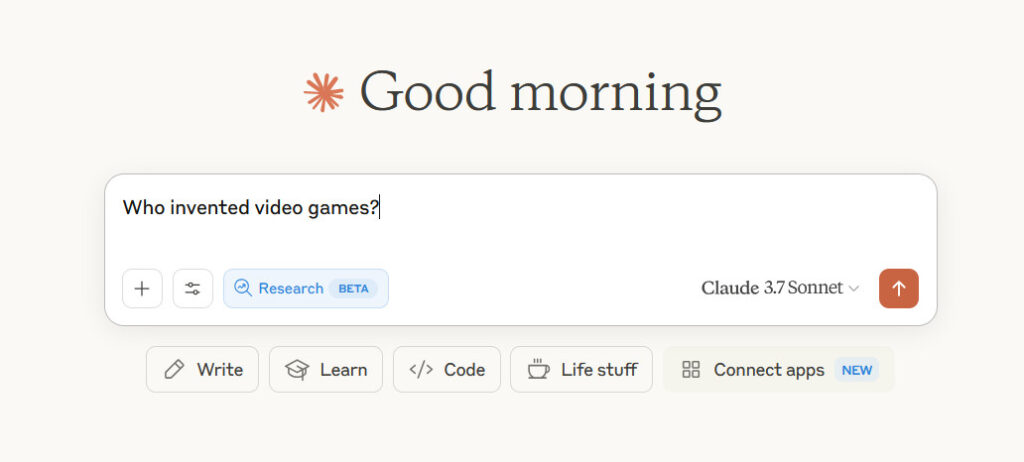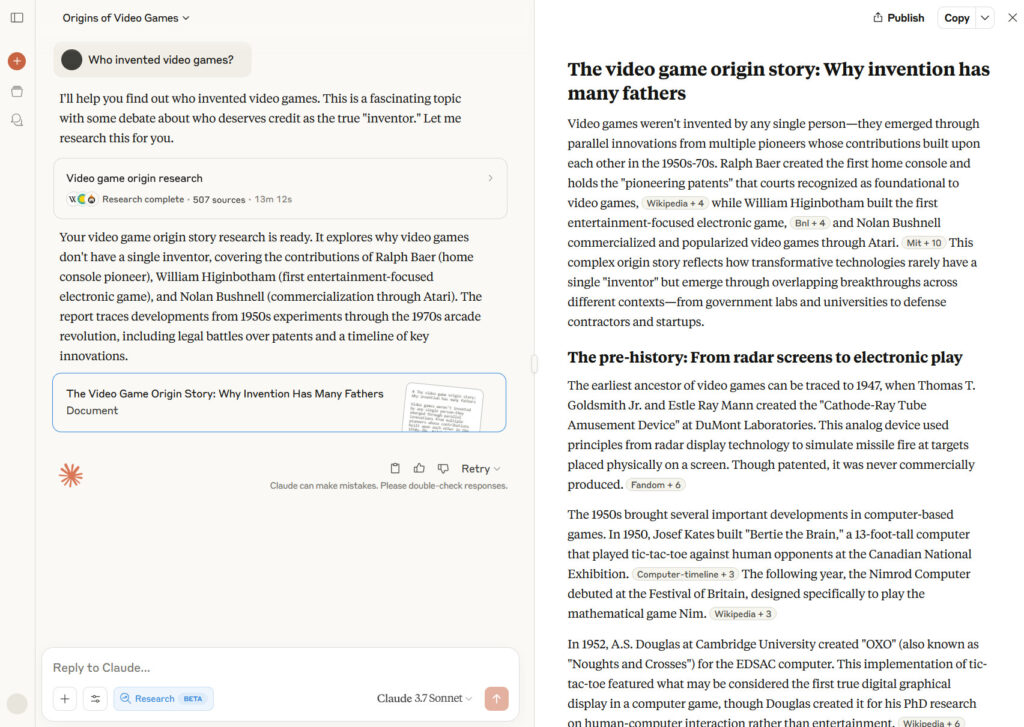
Credit: UCG via Getty Images
On Thursday, Anthropic announced significant upgrades to its AI assistant Claude, extending its research capabilities to run for up to 45 minutes before delivering comprehensive reports. The company also expanded its integration options, allowing Claude to connect with popular third-party services.
Much like Google's Deep Research (which debuted on December 11) and ChatGPT's deep research features (February 2), Anthropic announced its own "Research" feature on April 15. Each can autonomously browse the web and other online sources to compile research reports in document format, and open source clones of the technique have debuted as well.
Now, Anthropic is taking its Research feature a step further. The upgraded mode enables Claude to conduct "deeper" investigations across "hundreds of internal and external sources," Anthropic says. When users toggle the Research button, Claude breaks down complex requests into smaller components, examines each one, and compiles a report with citations linking to original sources.

A screenshot of Claude's web interface showing the "Research" button highlighted, captured May 2, 2025.
Credit: Benj Edwards
In our experience, most of these deep research features from the various AI vendors have worked fairly well, surfacing relevant research that can be difficult to find otherwise if you don't already know where to look. But users should be aware of the potential for confabulations within the results that might contain plausible-sounding AI-invented sources that don't exist.
A simple test
While most reports complete within 5 to 15 minutes, Anthropic says, the new research system can now take up to 45 minutes for particularly complex investigations—tasks that would typically require hours of manual research effort.
We can testify that AI-prepared research documents can definitely save some time gathering important and noteworthy sources. But you have to know what you're looking at to make sure you're not relying on irrelevant or false information. As always with AI outputs, do not trust any of them blindly. In this sense, AI search functions have arguably been most useful so far for experts in a particular field who can separate the wheat from the chaff.

A screenshot of Claude's web interface showing the results of automated research on the topic of who invented video games, captured May 2, 2025.
Credit: Benj Edwards
For example, we asked Anthropic's Research a simple question: "Who Invented Video Games?" After 13 minutes and 2 seconds of research, it constructed a fairly comprehensive and nuanced report, complete with sources, that, in my opinion (having written a lot about the subject over the past 20 years), provides a largely accurate historical overview that exceeds the quality of most video game history books in print today.
Still, the report contained a direct quote statement from William Higinbotham that appears to combine quotes from two sources not cited in the source list. (One must always be careful with confabulated quotes in AI because even outside of this Research mode, Claude 3.7 Sonnet tends to invent plausible ones to fit a narrative.) We recently covered a study that showed AI search services confabulate sources frequently, and in this case, it appears that the sources Claude Research surfaced, while real, did not always match what is stated in the report.
There's always room for interpretation and variation in detail, of course, but overall, Claude Research did a relatively good job crafting a report on this particular topic. Still, you'd want to dig more deeply into each source and confirm everything if you used it as the basis for serious research. You can read the full Claude-generated result as this text file, saved in markdown format. Sadly, the markdown version does not include the source URLS found in the Claude web interface.
Integrations feature
Anthropic also announced Thursday that it has broadened Claude's data access capabilities. In addition to web search and Google Workspace integration, Claude can now search any connected application through the company's new "Integrations" feature. The feature reminds us somewhat of OpenAI's ChatGPT Plugins feature from March 2023 that aimed for similar connections, although the two features work differently under the hood.
These Integrations allow Claude to work with remote Model Context Protocol (MCP) servers across web and desktop applications. The MCP standard, which Anthropic introduced last November and we covered in April, connects AI applications to external tools and data sources.
At launch, Claude supports Integrations with 10 services, including Atlassian's Jira and Confluence, Zapier, Cloudflare, Intercom, Asana, Square, Sentry, PayPal, Linear, and Plaid. The company plans to add more partners like Stripe and GitLab in the future.
Each integration aims to expand Claude's functionality in specific ways. The Zapier integration, for instance, reportedly connects thousands of apps through pre-built automation sequences, allowing Claude to automatically pull sales data from HubSpot or prepare meeting briefs based on calendar entries. With Atlassian's tools, Anthropic says that Claude can collaborate on product development, manage tasks, and create multiple Confluence pages and Jira work items simultaneously.
Anthropic has made its advanced Research and Integrations features available in beta for users on Max, Team, and Enterprise plans, with Pro plan access coming soon. The company has also expanded its web search feature (introduced in March) to all Claude users on paid plans globally.

-
 C114 Communication Network
C114 Communication Network -
 Communication Home
Communication Home


